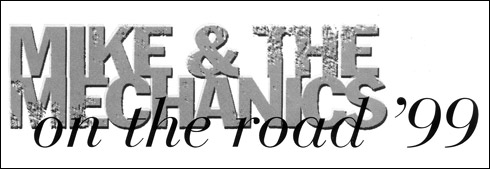- Article
- Read in 2 minutes
Mike + The Mechanics – London, Hanover Grand, May 10, 1999 – Warm Up Gig
Mike + The Mechanics played a warm-up gig to a select audience in the London club Hanover Grand – even before the album had come out.
Three days before the official tour start Mike and his band played a warm-up gig in a small hip club in Hanover Street, London. The selected audience consisted only of media representatives and people who had won competitions run by either the BBC or the UK Genesis fanclub The Waiting Room. The BBC also recorded the show and broadcast parts of it later.
The club was almost full and the audience in good spirits when the band took the stage. Some Mechanics fans may have been surprised to see a new face in the band. Jamie Moses replaced Tim Renwick who had been a live guitarist for the Mechanics since 1986. The fans expected very different sets, but whatever they may have hoped for or expected, a set list that was almost identical to that of the previous tour was certainly what nobody had wanted.
 The setlist followed the motto of “out go the Beggar songs, in go the M6 songs. Of course Beggar On A Beach Of Gold, Another Cup Of Coffee and especially Over My Shoulder are “old hits” for the band, fixtures in the set list; they also brought more applause than on the previous tour. Songs like Get Up, Living Years, All I Need Is A Miracle and Word Of Mouth must be played, too. But they absolutely need to come up with something different than drawing out the latter two songs to such an incredible length. A four-and-a-half minute version of Miracle without Paul Young’s almost ridiculous “All I Need”-gesticulations would be much better.
The setlist followed the motto of “out go the Beggar songs, in go the M6 songs. Of course Beggar On A Beach Of Gold, Another Cup Of Coffee and especially Over My Shoulder are “old hits” for the band, fixtures in the set list; they also brought more applause than on the previous tour. Songs like Get Up, Living Years, All I Need Is A Miracle and Word Of Mouth must be played, too. But they absolutely need to come up with something different than drawing out the latter two songs to such an incredible length. A four-and-a-half minute version of Miracle without Paul Young’s almost ridiculous “All I Need”-gesticulations would be much better.
We need not say much about that bit where they play three songs by bands in which the three main Mechanics (used to) play, except that ingenuity is not part of the Mechanics’ vocabulary. The brilliant version of Silent Running they played on the previous tour was not played in London. The songs from the new album became therefore the most interesting part of the show. They were played as well as the rest of the programme. The Mechanics obviously enjoyed their show. Jamie Moses did a great job, but fans felt he was no replacement for his friendly predecessor. Paul Carrack showed off his versatility by playing at different times the keyboards, the acoustic guitar and the bass (and singing, of course).
Paul Young played the entertainer, sang, played the bass sometimes or percussion at other times – or even the keyboards. Mike and “new boy” Jamie Moses played everything with four or six strings. Gary Wallis was unobtrusive; we could not say anything either good or bad about him. The spotlight was, as always Paul Young’s, who really gets into the frontman role. It seems that Mike and the guys were happy with the success of the show because they played almost the same set at the shows that followed. Well, why change anything when 80 percent of the audience enjoy the many hits the Mechanics have? When you play a concert you want to please the majority of the audience, and you cannot do that with a set that contains unknown, older or even less accessible songs. It does not matter, then, that the remaining 20 percent might be really thrilled to hear, say, The Ghost Of Sex And You or Why Me live. The Mechanics gigs are not bad at all, but it is a sad thing that a band who have put out five studio albums compile a setlist of a mere 90 minutes from only the commercially most successful material.
by Helmut Janisch
English by Martin Klinkhardt
first published in it magazine #27 (fall 1999)

